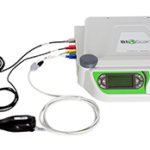Biofeedback Testing for Gluten Sensitivity
 In a novel study, researchers at the Mayo Clinic tested blood samples taken from 9,133 young Air Force recruits in the 1950s and found that about 1 in 700 had undiagnosed celiac disease at that time. Tests on subjects exactly the same age now found that the rate was nearly five times as high today.
In a novel study, researchers at the Mayo Clinic tested blood samples taken from 9,133 young Air Force recruits in the 1950s and found that about 1 in 700 had undiagnosed celiac disease at that time. Tests on subjects exactly the same age now found that the rate was nearly five times as high today.
“Human genes haven’t changed that much, so there has to be something pervasive in the environment that is making this disease more common,” says Joseph Murray, a Mayo gastroenterologist who led the study, published in the journal Gastroenterology last year. It may be that people are more susceptible because we are eating much more wheat today—or that wheat is being processed or cultivated differently.
What is gluten?
Gluten is a protein found in many grains such as wheat, semolina, spelt, kamut, rye and barley. Oats do not inherently contain gluten, however due to cross-contamination in the processing methods, it should be assumed that oats contain gluten unless purchased as certified gluten-free.
Gluten (Latin word glue) is what gives bread its airy and fluffy texture and dough its sticky texture. Having a gluten intolerance myself, I am hyperaware of how many different products it is in. Gluten is found in almost everything! Its so ubiquitous that our government does not require that it be labeled on packages and it is often hidden under names such as hydrolyzed vegetable protein, modified food starch or vegetable protein.
Gluten is also used as a stabilizing agent in many packaged and processed foods such as salad dressings and mayonnaise. Its in beauty products, makeup, shampoo, lotions, medications and supplements. Its even in non self-adhesive stamps and envelopes.
What is wrong with eating gluten?
For some people, there is absolutely nothing wrong with eating gluten. However, for many, it is a real problem contributing to real disease. Up to 30% of those of European descent carry the genes for celiac disease, which means they are at higher risk for having health problems related to eating gluten.2 It is estimated that 1 in 30 people have gluten sensitivity and 1 in 200 have full-blown celiac disease.
The prevalence of celiac and gluten intolerance has increased significantly over the last 50 years. One study that was published in Gastroenterology compared 10,000 blood samples from individuals 50 years ago to 10,000 people today and found that there has been a 400% increase in the incidence in celiac disease.3
One theory as to why there has been such a dramatic increase in celiac disease is that the wheat in the United States has been genetically modified and contains much higher amounts of gluten. By doing so, the food industry has been able to super size food and create products like extra large cinnamon buns and gigantic fluffy bagels. This may be the reason why many of my gluten sensitive patients can tolerate eating bread and pasta when traveling in Europe. European wheat has not been genetically altered and contains lower amounts of gluten than the USA version.
As I have shared with you before, inflammation is the root cause to so many diseases. Both celiac and gluten sensitivity create inflammation that can affect virtually every organ system in your body.
In a study that followed 30,000 patients with diagnosed celiac disease, undiagnosed celiac disease, and gluten sensitivity from 1969 to 2008, they found that each of these groups had significantly higher mortality than participants who were not affected by gluten.
Read the full article:
http://www.illuminateme.org/health/gluten-sensitivity-is-something-you-are-eating-making-you-sick.html
A review paper in The New England Journal of Medicine listed 55 “diseases” that can be caused by eating gluten. These include osteoporosis, irritable bowel disease, inflammatory bowel disease, anemia, cancer, fatigue, canker sores, and rheumatoid arthritis, lupus, multiple sclerosis, and almost all other autoimmune diseases. Gluten is also linked to many psychiatric and neurological diseases, including anxiety, depression, schizophrenia, dementia, migraines, epilepsy, and neuropathy (nerve damage). It has also been linked to autism.
Biofeedback Testing is an accurate way of telling whether a person is sensitive or intolerant to gluten. Some of the most common complaints caused by gluten sensitivity are: foggy head, fatigue, digestive issues including IBS, Leaky Gut, nausea, vomiting, ADD, ADHD, headaches, depression, thyroid issues, PMS, inflammation, auto immune diseases, rheumatoid arthritis, joint pain, osteoporosis, slow growth in children, skin diseases, Sjorgren’s, kidney stones, malnutrition, diabetes (type 1), liver disease, and much more. Call today 303-257-0058
The FDA has not evaluated these statements. biofeedback testing or anything talked about on this website is not a medical diagnosis, treatment or cure. Consult your Physician for medical advise.


